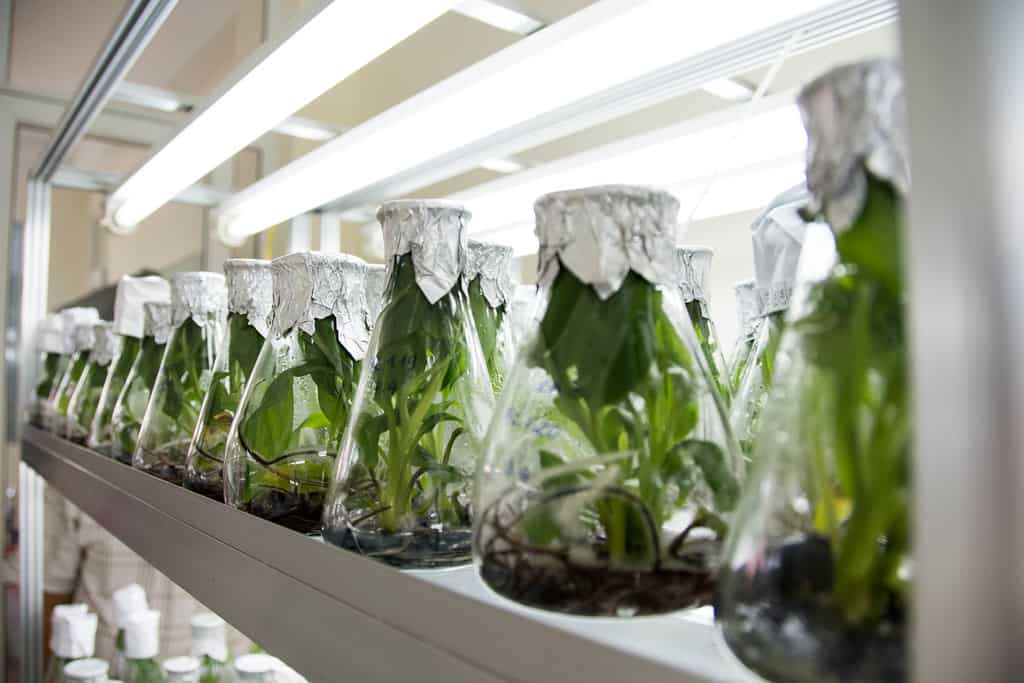SRUK/CERU, en colaboración con la Oficina Para Asuntos Culturales y Científicos de la Embajada de España en Londres, organiza un Foro de Bitoecnología Vegetal los días 22 y 23 de febrero de 2022 para reunir a invesigadores y empresas trabajando en este campo.
Los objetivos principales de este evento son:
– Concienciar sobre la importancia de la biotecnología vegetal para afrontar alguno de los retos de las próximas décadas como la provisión mundial de alimentos y la crisis climática.
– Resaltar la investigación puntera desarrollada en este campo por instituciones españolas y británicas.
– Impulsar las colaboraciones enrte académicos y empresas de España y Reino Unido trabajando en este sector.
El evento durará dos días y será online para facilitar la participación de investigadores y empresas de ambos países. La primera jornada se iniciará con una breve presentación de cada uno de los centros de investigación colabroadores. A continuación, habrá cuatro sesiones centradas en los siguientes temas:.
– Alternativas a fertilizantes químicos y microbiología del suelo
– Estrategias para aumentar la producción
– Infección y resistencia
– Calidad alimentaria y nuevas estrategias de mejora vegetal
Cada una de las jornadas incluirá ponencias de académicos y también de representantes de empresas del sector agrotecnológico. Al final de cada sesión habrá nua mesa redonda para que los participantes puedan debatir sobre las futuras perspectivas del tema en cuestión e identificar posibles áreas de colaboración.
Al inicio de la segunda jornada, habrá una mesa redonda centrada en la importancia de la investigación en innovación en biotecnología vegetal. Académicos, empresas e instituciones tomarán parte en esta discusión.
REGISTRO
El registro al evento es gratuito y abierto al público. Te puedes registrar ya AQUÍ.
Los asistentes registrados recibirán un enlace para conectarse a la reunión la semana del evento.
PROGRAMA
Tuesday 22nd February
09:00 – 09:20 Welcome and opening
09:20 – 10:20 Presentation of participating research institutions.
– Centre for Plant Biotechnology and Genomics (CBGP)
– Centre for Research in Agricultural Genomics (CRAG)
– Institute of Subtropical and Mediterranean Horticulture (ISMH)
– Institute for Plant Molecular and Cellular Biology (IBMCP)
– John Innes Centre (JIC)
– Rothamsted Research
– BIOVEGEN
10:40 – 12:40 Session 1: Alternatives to chemical fertilisers and soil microbiology
Chair: Javier Pardo-Diaz, University of Oxford
– How do barley plants promote a healthy soil microbiome? – Alba Pacheco-Moreno, John Innes Centre
– Shaping microbial physiology through carbon and nitrogen metabolism – Carmen Sánchez-Cañizares, University of Oxford
– Legumes, getting the time right – Beatriz Lagunas, University of Warwick
– Is it possible to engineer nitrogen fixing cereals? – Luis Rubio, Centre for Plant Biotechnology and Genomics
– Microomics Systems S.L. – Pedro Iñaki González Torres (CEO/COO)
– Symbio – Dreide Charleston (Research and Technical Manager)
14:00 – 16:00 Session 2: Approaches to increasing crop yield
Chair: Marina Millán-Blánquez, John Innes Centre
– Sustainable strategies to improve yield in horticultural systems – Iñaki Hormaza, Institute of Subtropical and Mediterranean Horticulture
– How to be a root and survive a heat wave – Juan Carlos del Pozo, Centre for Plant Biotechnology and Genomics
– Dissecting yield: from ovule to seed – Laura Siles, Rothamsted Research
– Increasing fruit and seed production in monocarpic/annual crops – Cristina Ferrándiz, Institute for Plant Molecular and Cellular Biology
– Abiopep S.L. – Yolanda Hernando Saiz (CEO and Funding Partner)
– Corteva Agriscience – Ricardo Carrasco (Senior Research Manager) & Fernando Parques (Field Technician)
Wednesday 23rd February
09:00 – 10:20 Round table: Plant biotechnology to tackle the challenges of the 21st century
Moderator: Javier Pardo – Science Diplomacy Intern, Embassy of Spain in London
– Jose Juan Sánchez – Deputy Director General for Internationalisation of Science and Innovation, Spanish Ministry of Science and Innovation
– Emma Markham – Senior Research Portfolio Manager, Biotechnology and Biological Sciences Research Council
– M. Isabel Díaz – Full Professor in Biochemistry and Molecular Biology, Centre for Plant Biotechnology and Genomics
– Josep Mª Casacuberta – CSIC Associate Professor, Centre for Research in Agricultural Genomics
– Cristina Barrero Sicilia – Lecturer in Biomedical Science (Genetics), University of Hertfordshire
– Martí Munar Palmer – Predoctoral researcher, Centre for Plant Biotechnology and Genomics
10:40 – 12:40 Session 3: Infection and resistance
Chair: Berta Gallego Páramo (Royal Botanical Gardens, Kew)
– Plant immunity mediated by cell wall derived signals: lessons and applications to sustainable agriculture – Antonio Molina, Centre for Plant Biotechnology and Genomics
– Developing sustainable approaches to protect wheat roots from take-all disease – Javier Palma-Guerrero, Rothamsted Research
– New strategies to fight emerging bacterial wilt diseases in plants – Núria Sánchez-Coll, Centre for Research in Agricultural Genomics
– Unlocking the biocontrol potential of kiwifruit Pseudomonas – Javier Martinez-Perez, John Innes Centre
– Replacing chemistry with genetics for the control of potato late blight – Jonathan Jones, The Sainsbury Laboratory
– Bioiberica S.A.U. – Nuria Sierras Sierra (Head of R&D Plant Heath)
– Syngenta UK Ltd. – Deepak Kaundun
14:00 – 16:00 Session 4: Breeding and quality improvement techniques
Chair: Natalia Miguel-Vior (John Innes Centre)
– Targeted breeding and circular bioeconomy of horticultural crops – David Posé, Institute of Subtropical and Mediterranean Horticulture
– Genetic and genomic approaches to understand agronomic and metabolic traits in the Salicaceae – Sergio Cerezo Medina, Rothamsted Research
– Genomic Assisted Breeding strategies in fruit trees and other plants – Amparo Monfort, Centre for Research in Agricultural Genomics
– Small RNAs for crop improvement – Sara Lopez-Gomollon, University of Cambridge
– Using wild species and unadapted germplasm to improve crop quality – Antonio Monforte, Institute for Plant Molecular and Cellular Biology
– Phytoplant Research S.L – Eva Madrid (Breeding and Cultivation Researcher)
– AVASA (Agrupación de Viveristas de Agrios S.A.) – José Cuenca (Technical Director)
16:00 – 16:10 Closing remarks
Organised by

In collaboration with




